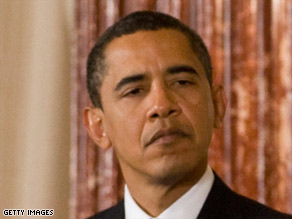
As the debate plays out about whether President Obama’s decision to send an additional 17,000 troops to Afghanistan will help ease the increase in Taliban insurgency, the president is reaching out to allies for help.
Obama said in an interview on Canadian television Tuesday that diplomacy will play a bigger role in U.S. efforts in Afghanistan. “I am absolutely convinced that you cannot solve the problem of Afghanistan, the Taliban, the spread of extremism in that region solely through military means,” Obama told journalist Peter Mansbridge in a wide-ranging interview with the Canadian Broadcasting Corporation. “We’re going to have to use diplomacy. We’re going to have to use development.” The Pentagon announced Tuesday that Obama had approved a significant troop increase for Afghanistan, which is expected to include 8,000 Marines and 4,000 Army troops. An additional 5,000 troops will be deployed at a later date to support combat forces, bringing the total to 17,000, the Defense Department said. View a chart of U.S. troop levels in Afghanistan » Canada has about 2,800 troops in Afghanistan, but Parliament has voted to pull them out by 2011. Obama suggested he will take up the issue with Canadian Prime Minister Stephen Harper when the two meet Thursday in Ottawa. That may be why Obama is reaching out to Canada to help ease the burden on U.S. troops in Afghanistan, who may remain there as long as five years, according to Gen. David McKiernan, commander of U.S. and NATO forces in Afghanistan. “This is not a temporary force uplift,” McKiernan told reporters. “It will need to be sustained for some period of time, for the next three to four to five years.”
Don’t Miss
Extra forces could stay in Afghanistan 5 years
Obama: Troops alone cannot win in Afghanistan
Afghanistan to help review U.S. war on terror
CNN security analyst Peter Bergen said the United States shouldn’t necessarily count on NATO countries to lend a hand. “I think it’s probably not very realistic. … We’ve constantly asked our NATO allies … for more soldiers on the ground. Very few NATO countries are going to be willing to send their soldiers into harm’s way,” he said. Watch more on the U.S. efforts in Afghanistan » Bergen said that while some nations like Great Britain may step in, “You’re only looking at a few thousand soldiers, even if those countries stood up to the plate. “You’re not going to get the Germans or the French, I think, to send significant numbers of additional soldiers to what is, after all, a pretty hot war now.” Bergen added that if the U.S. and allied forces look to deal with the Taliban in the form of negotiations, it’s going to be from a “position of strength.” Watch an interview with a Taliban commander » “That’s one of the reasons we’re seeing this large deployment of American soldiers into the south. There’s no point, I think, of people thinking — there’s no having these negotiations with the Taliban from a position of weakness. Better to do it from a position of strength,” he said. In an interview on CNN’s “Fareed Zakaria GPS,” which aired Sunday, Afghan President Hamid Karzai said that, with a resurgent Taliban, a still-flourishing drug trade and a border with Pakistan believed to be home base for al Qaeda, his country can’t afford for U.S. troops to leave any time soon. “U.S. forces will not be able to leave soon in Afghanistan because the task is not over,” Karzai said. “We have to defeat terrorism. We’ll have to enable Afghanistan to stand on its own feet. We’ll have to enable Afghanistan to be able to defend itself and protect for its security…. “Then, the United States can leave and, at that time, the Afghan people will give them plenty of flowers and gratitude and send them safely back home.” At the same time, Karzai said the actions of troops currently in Afghanistan have turned some of the public against them. “It’s the question of civilian causalities. It’s a question of risk of Afghans. It’s the question of home searches,” he said. “These activities are seriously undermining the confidence of the Afghan people in the joint struggle we have against terrorism and undermining their hopeful future.” In the Logar and Wardak provinces, close to the capital of Kabul, there has been an alarming increase in Taliban attacks. Some 3,000 U.S. troops are likely to be based in the area, trying to prevent Taliban infiltration and getting the cooperation of local people. The locals, however, appear to have mixed feelings about the new presence. One person told CNN’s Atia Abwai that locals are fine with U.S. forces bringing security, but “not airstrikes.”
The man said locals don’t want people coming into Afghan homes and killing other Afghan citizens. Watch more on Afghan citizens’ concerns Abwai is embedded with the U.S. Army’s 10th Mountain Division in eastern Afghanistan.